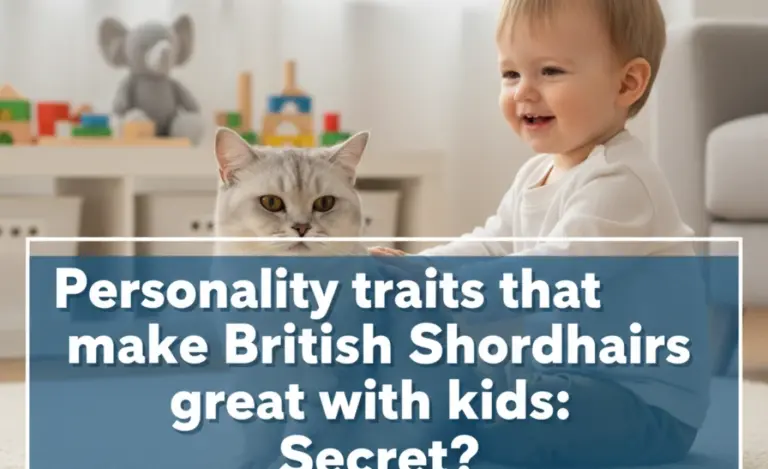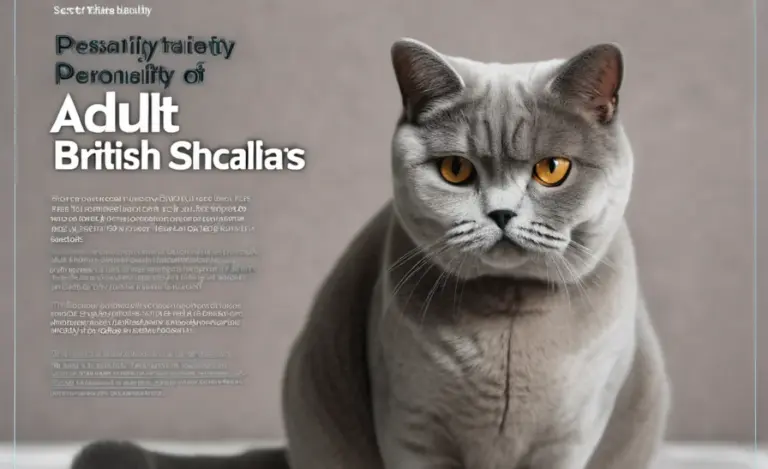Personality traits that make British Shorthairs loyal companions
British Shorthairs are known for their calm and affectionate nature, making them loyal companions. Key traits include their independence, sociability, and moderate energy levels, which allow them to bond closely with their owners while still enjoying their own space. They’re also known for being gentle and good-natured, fitting well into various households.
Is a British Shorthair the right cat breed for you? It’s a big question! Many people dream of a furry friend who’s both cuddly and independent. You want a cat that loves you but doesn’t demand constant attention, right? It’s all about finding the perfect balance. You’re likely wondering what makes a British Shorthair so special.
I’m Frances O’Brien, and I’ve spent years helping people understand and care for these wonderful cats. In this guide, I’ll walk you through the personality traits that make British Shorthairs such loyal companions. We’ll explore their gentle nature, how they interact with families, and what you can expect as an owner. Ready to find out if a British Shorthair is your purr-fect match? Let’s get started!
Understanding British Shorthair Loyalty
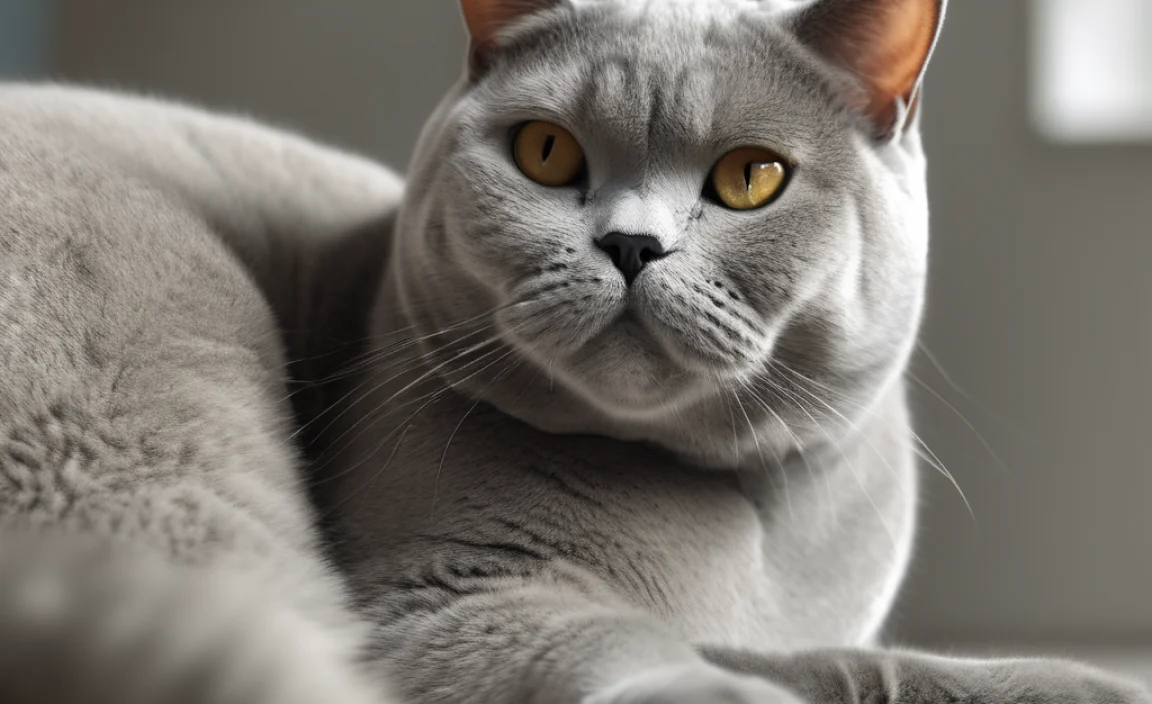
British Shorthairs are often described as loyal cats, but what does that really mean? It’s not the same as a dog’s enthusiastic devotion. Instead, their loyalty is shown through quiet companionship and a steady presence. Let’s explore what makes them such devoted pets.
Defining Loyalty in Cats
Loyalty in cats isn’t always obvious. Unlike dogs, cats don’t typically follow you around or shower you with constant attention. Instead, they show their loyalty through:
- Companionship: Being near you and enjoying your company.
- Affection: Showing love through purring, rubbing, and gentle kneading.
- Trust: Feeling safe and secure in your presence.
- Consistency: Offering a steady, predictable presence in your life.
With British Shorthairs, this often translates to a calm, loving presence that’s always there without being overbearing.
The Unique Loyalty of British Shorthairs
British Shorthairs have a particular way of showing their loyalty. They’re known for being:
- Independent but Affectionate: They enjoy their own space but also love to cuddle when they feel like it.
- Gentle and Calm: They’re not usually demanding or clingy, making them easy to live with.
- Good with Families: They tend to bond with all members of the household, not just one person.
This unique blend of traits makes them excellent companions for people who want a loving but low-key pet.
Key Personality Traits That Foster Loyalty
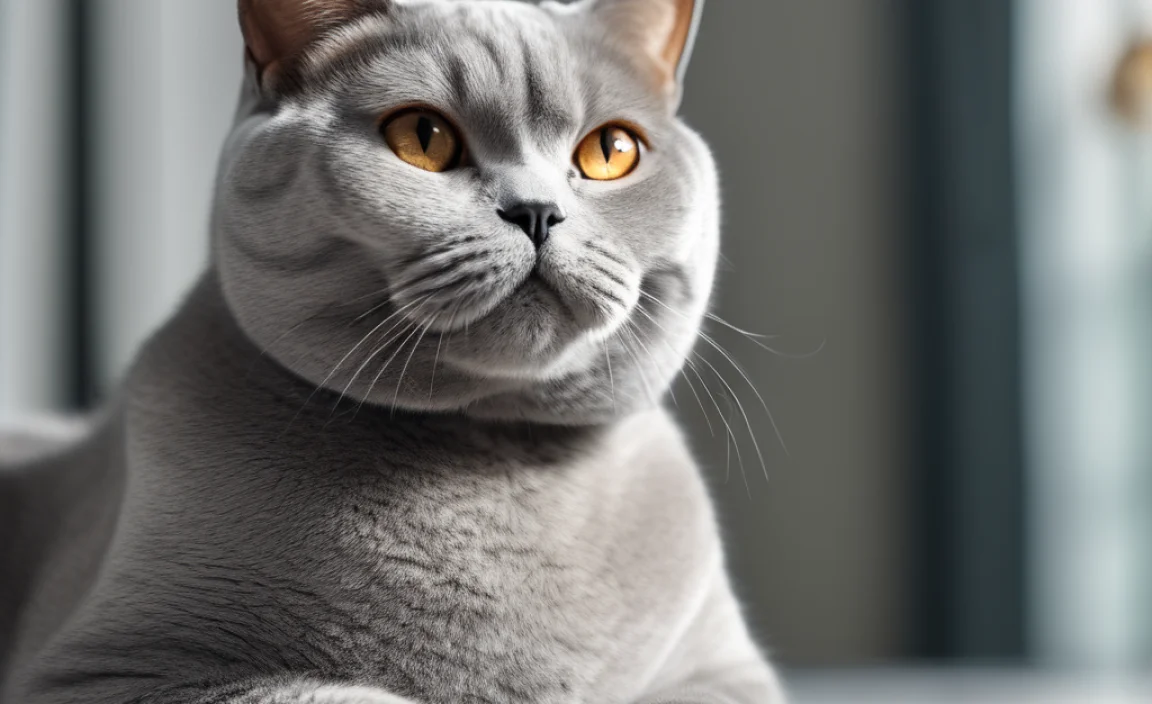
Several personality traits contribute to the British Shorthair’s loyal nature. These traits make them ideal companions for a variety of households. Let’s dive into these characteristics.
Calm and Docile Temperament
One of the most defining traits of British Shorthairs is their calm temperament. They’re not usually hyperactive or easily agitated. This calmness makes them great companions because:
- They’re Relaxing to Be Around: Their peaceful presence can help reduce stress.
- They Adapt Well to Different Environments: They’re not easily spooked by changes in their surroundings.
- They’re Good with Children: Their gentle nature makes them patient with kids.
According to the RSPCA, a calm environment is key for a cat’s well-being, and British Shorthairs naturally contribute to this.
Moderate Energy Levels
British Shorthairs aren’t high-energy cats. They enjoy playing, but they also appreciate lounging around. This moderate energy level means:
- They Don’t Require Constant Attention: They’re happy to entertain themselves.
- They’re Content Indoors: They don’t need a lot of outdoor space to be happy.
- They’re Easy to Exercise: A few play sessions a day are usually enough to keep them fit.
This balance makes them suitable for people who work or have busy lifestyles but still want a loving pet.
Independence and Sociability
British Shorthairs strike a good balance between independence and sociability. They enjoy spending time with their owners but also value their alone time. This means:
- They Don’t Suffer from Separation Anxiety: They can handle being left alone for reasonable periods.
- They Greet You Affectionately: They’re always happy to see you when you come home.
- They Enjoy Cuddling on Their Own Terms: They’ll come to you for affection when they’re ready.
This blend of traits makes them ideal for people who want a cat that’s both loving and self-sufficient.
Gentle and Good-Natured
British Shorthairs are known for their gentle and good-natured personalities. They’re typically not aggressive or easily provoked. This gentleness means:
- They’re Safe Around Children: They’re patient and tolerant.
- They Get Along with Other Pets: They usually coexist peacefully with dogs and other cats.
- They’re Easy to Handle: They tolerate grooming and vet visits well.
The International Cat Association (TICA) highlights their adaptability as a key trait, making them excellent family pets.
How British Shorthairs Show Affection
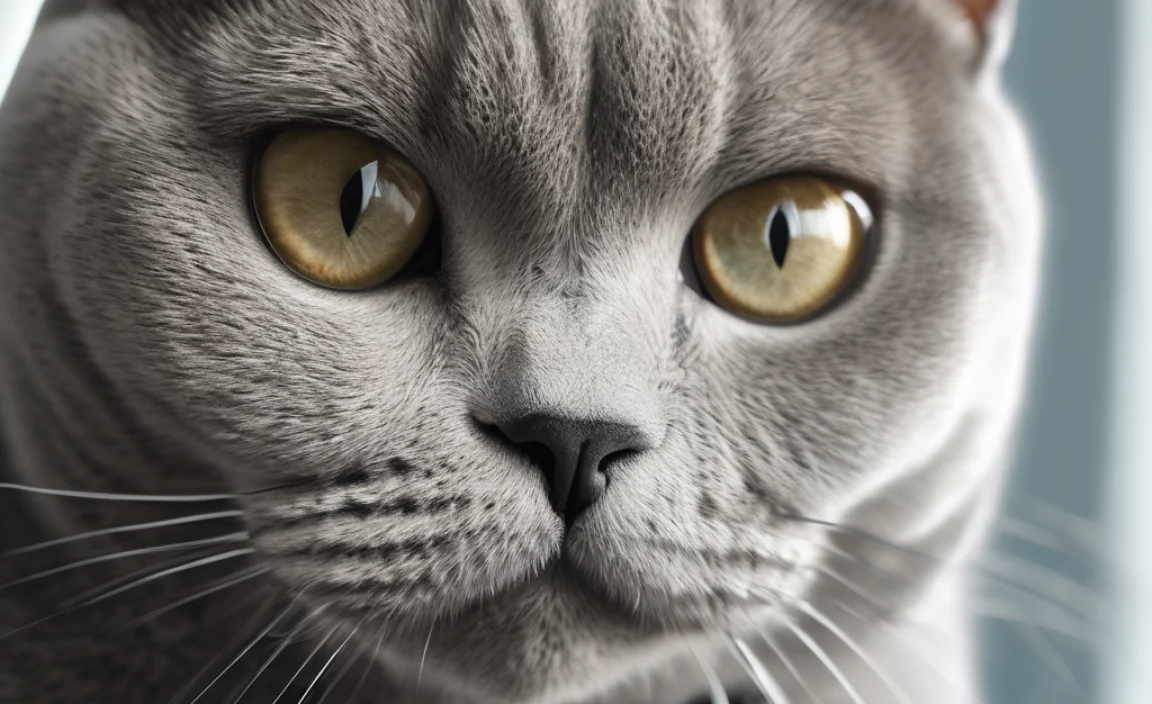
While British Shorthairs might not be as overtly affectionate as some other breeds, they have their own special ways of showing love and devotion. Understanding these subtle cues can help you strengthen your bond with your feline friend.
Subtle Signs of Affection
British Shorthairs often display affection in understated ways. Look out for these subtle signs:
- Purring: A soft, contented purr is a clear sign of happiness and affection.
- Rubbing: Gently rubbing against your legs or face is a way of marking you with their scent and showing affection.
- Following You Around: Even if they’re not right next to you, keeping you in sight is a sign they enjoy your company.
- Slow Blinking: Often called “cat kisses,” a slow blink is a sign of trust and affection.
These small gestures are their way of saying, “I love you.”
Physical Affection on Their Terms
British Shorthairs enjoy physical affection, but they prefer to initiate it. This means:
- They’ll Come to You for Cuddles: They’ll hop on your lap or snuggle beside you when they’re in the mood.
- They Appreciate Gentle Petting: They enjoy being stroked gently, especially around their head and cheeks.
- They Might Knead You: This behavior, also known as “making biscuits,” is a sign of contentment and comfort.
Respecting their boundaries and letting them come to you will strengthen your bond.
Vocal Communication
While not overly vocal, British Shorthairs do communicate through sound. Listen for:
- Soft Meows: They might meow softly to greet you or ask for attention.
- Chirps and Trills: These sounds often indicate excitement or curiosity.
- Purrs: As mentioned earlier, purring is a clear sign of happiness.
Paying attention to their vocalizations can help you understand their needs and moods.
Building a Strong Bond with Your British Shorthair
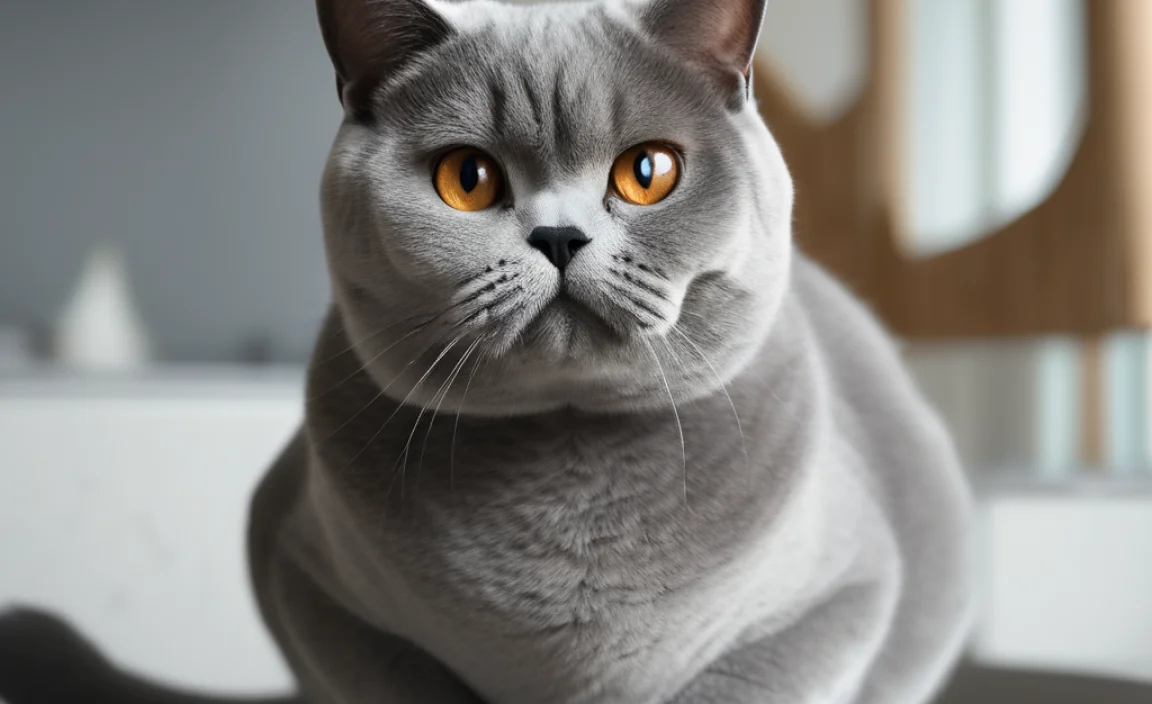
Creating a strong, lasting bond with your British Shorthair involves understanding their needs and preferences. Here are some practical ways to foster a deeper connection.
Creating a Comfortable Environment
A comfortable environment is essential for a happy British Shorthair. Make sure they have:
- A Safe Space: A quiet, cozy spot where they can retreat when they feel overwhelmed.
- Comfortable Bedding: A soft bed or blanket where they can relax and sleep.
- Scratching Posts: To satisfy their natural instinct to scratch and keep their claws healthy.
According to the Cornell Feline Health Center, providing a stimulating environment is crucial for a cat’s mental and physical health.
Engaging in Playtime
Playtime is a great way to bond with your British Shorthair. Try:
- Interactive Toys: Feather wands, laser pointers, and puzzle toys can keep them entertained.
- Short, Frequent Play Sessions: A few minutes of play each day is better than one long session.
- Rotating Toys: Keep things interesting by switching out toys regularly.
Playtime not only provides exercise but also strengthens your connection.
Providing Consistent Care
Consistent care is key to building trust and loyalty. This includes:
- Regular Feeding: Providing high-quality food at consistent times.
- Grooming: Brushing their coat regularly to prevent mats and tangles.
- Health Checkups: Taking them to the vet for regular checkups and vaccinations.
Showing that you care for their well-being will deepen your bond.
Respecting Their Boundaries
British Shorthairs appreciate having their boundaries respected. This means:
- Letting Them Initiate Affection: Don’t force cuddles or petting if they’re not in the mood.
- Giving Them Space When They Need It: If they retreat to their safe space, let them be.
- Avoiding Overstimulation: Pay attention to their body language and stop petting them if they seem uncomfortable.
Respecting their independence will make them feel more secure and loved.
British Shorthairs and Family Dynamics
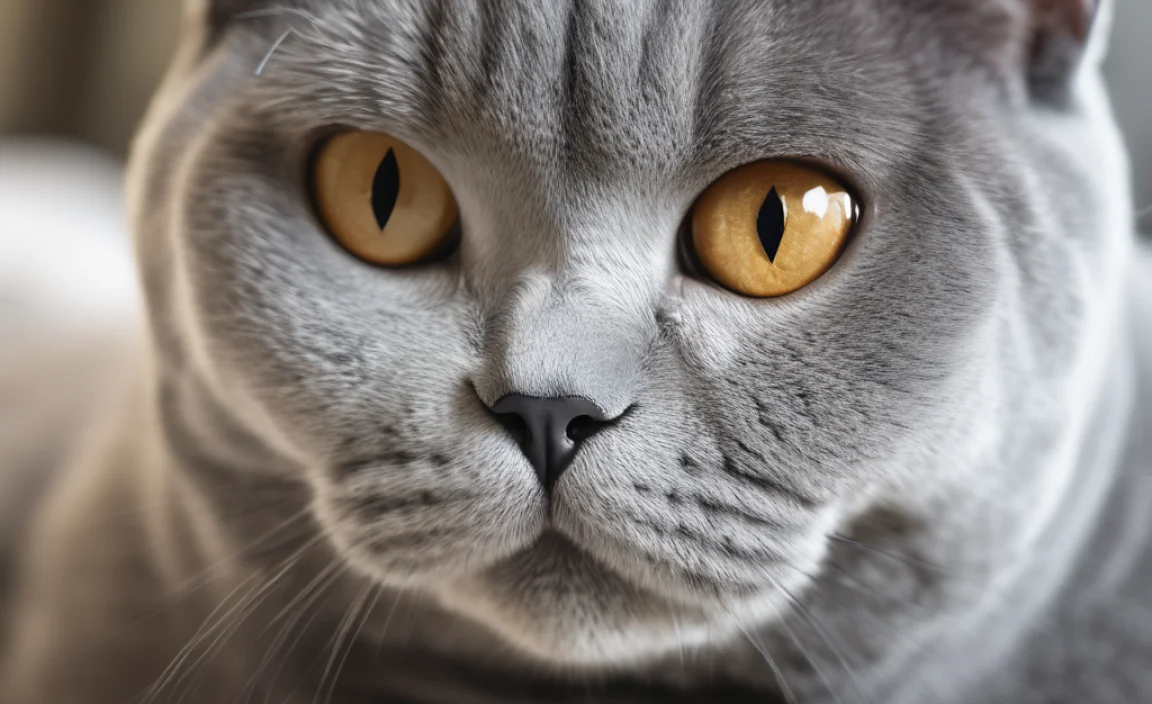
British Shorthairs are known for integrating well into family life. Their adaptable nature makes them suitable companions for households with children, seniors, and other pets. Let’s see how they fit in.
British Shorthairs with Children
British Shorthairs are generally good with children due to their patient and tolerant nature. However, it’s important to:
- Teach Children to Be Gentle: Show kids how to handle the cat respectfully.
- Supervise Interactions: Always supervise young children when they’re interacting with the cat.
- Provide a Safe Escape: Make sure the cat has a place to retreat if they feel overwhelmed.
With proper guidance, British Shorthairs and children can form loving bonds.
British Shorthairs with Seniors
British Shorthairs make excellent companions for seniors due to their calm and low-maintenance nature. They provide:
- Companionship: Offering a steady, loving presence.
- Reduced Stress: Their calm demeanor can help reduce anxiety.
- Easy Care: They don’t require a lot of exercise or attention.
Their gentle nature makes them ideal pets for older adults.
British Shorthairs with Other Pets
British Shorthairs typically get along well with other pets, especially if they’re introduced properly. To ensure a harmonious household:
- Introduce Them Slowly: Allow them to get used to each other’s scent before meeting face-to-face.
- Provide Separate Resources: Make sure each pet has their own food, water, and litter box.
- Supervise Interactions: Monitor their interactions to ensure they’re getting along.
With patience and proper introductions, British Shorthairs can coexist peacefully with dogs and other cats.
| Household Member | Considerations |
|---|---|
| Children | Teach gentle handling, supervise interactions |
| Seniors | Provide companionship, require low maintenance |
| Other Pets | Introduce slowly, provide separate resources |
Common Misconceptions About British Shorthair Loyalty
There are several misconceptions about British Shorthair loyalty that can lead to misunderstandings. Let’s clear up some of these common myths.
Myth: They Are Aloof and Unaffectionate
Reality: While British Shorthairs aren’t as overtly affectionate as some breeds, they do show love in their own way. They enjoy cuddling and being near their owners, but they prefer to initiate the interaction.
Myth: They Only Bond with One Person
Reality: British Shorthairs typically bond with all members of the household, not just one person. They may have a favorite, but they generally show affection to everyone.
Myth: They Don’t Need Attention
Reality: While they’re independent, British Shorthairs still need attention and interaction. They enjoy playtime, grooming, and simply being in your presence.
Myth: They Are Always Calm
Reality: While they have a calm temperament, British Shorthairs can still get excited and playful. They enjoy chasing toys and exploring their environment.
Addressing Potential Behavioral Issues
Even with their generally good-natured personalities, British Shorthairs can sometimes exhibit behavioral issues. Understanding these potential problems and how to address them is crucial.
Common Behavioral Problems
Some common behavioral problems in British Shorthairs include:
- Scratching Furniture: This is a natural behavior, but it can be redirected to a scratching post.
- Overeating: British Shorthairs are prone to weight gain, so it’s important to monitor their food intake.
- Litter Box Issues: This can be caused by stress, medical issues, or an unclean litter box.
- Aggression: This is rare, but it can occur if the cat is feeling threatened or stressed.
Solutions and Training Tips
Here are some solutions and training tips to address these issues:
- Provide Scratching Posts: Offer a variety of scratching posts and reward them for using them.
- Control Food Portions: Feed them measured portions of high-quality food.
- Keep the Litter Box Clean: Scoop the litter box daily and clean it thoroughly once a week.
- Identify and Eliminate Stressors: Create a calm and stable environment for your cat.
When to Seek Professional Help
If behavioral issues persist or worsen, it’s important to seek professional help. A veterinarian or certified cat behaviorist can help identify the underlying cause and develop a treatment plan.
Nutritional Needs for a Happy British Shorthair
Proper nutrition plays a vital role in the health and happiness of your British Shorthair. Feeding them a balanced diet ensures they stay healthy, active, and loyal.
Choosing the Right Food
When selecting food for your British Shorthair, consider the following:
- High-Quality Ingredients: Look for food with real meat as the primary ingredient.
- Age-Appropriate Formula: Choose food that’s formulated for their age (kitten, adult, or senior).
- Avoid Fillers: Avoid foods with excessive fillers like corn, wheat, and soy.
- Wet vs. Dry Food: A combination of wet and dry food can provide optimal hydration and nutrition.
Purina offers a range of cat foods that meet these criteria.
Portion Control and Feeding Schedule
British Shorthairs are prone to weight gain, so it’s important to control their portions. Follow these guidelines:
- Measure Food Portions: Use a measuring cup to ensure you’re feeding the correct amount.
- Feed Twice a Day: Divide their daily food allowance into two meals.
- Avoid Free-Feeding: Don’t leave food out all day, as this can lead to overeating.
- Monitor Weight: Weigh your cat regularly and adjust their food intake as needed.
Hydration
Proper hydration is essential for your cat’s health. Make sure they have access to fresh, clean water at all times. Consider:
- Multiple Water Sources: Place water bowls in different locations around the house.
- Water Fountain: Some cats prefer drinking from a water fountain.
- Wet Food: Wet food can help increase their water intake.
Grooming Tips to Enhance Your Bond
Regular grooming is not only essential for your British Shorthair’s health but also a great way to strengthen your bond. These sessions provide an opportunity for close interaction and affection.
Brushing
Brushing is a key part of grooming a British Shorthair. Aim to brush them:
- Several Times a Week: Regular brushing helps prevent mats and tangles.
- Use the Right Brush: A slicker brush or metal comb works well for their thick coat.
- Be Gentle: Brush gently to avoid irritating their skin.
Bathing
British Shorthairs don’t need to be bathed frequently. However, a bath may be necessary if they get dirty or develop an odor. When bathing them:
- Use Cat-Specific Shampoo: Avoid using human shampoo, as it can be harsh on their skin.
- Rinse Thoroughly: Make sure to rinse all the shampoo out of their coat.
- Dry Them Gently: Use a soft towel or a low-heat hairdryer to dry them.
Nail Trimming
Regular nail trimming is important to prevent overgrowth and injury. Trim their nails:
- Every Few Weeks: Use cat nail clippers to trim the tips of their nails.
- Avoid the Quick: Be careful not to cut into the quick, which is the pink part of the nail.
- Reward Them: Give them a treat after trimming their nails to make it a positive experience.
Ear Cleaning
Check their ears regularly for dirt and wax buildup. Clean their ears:
- With a Cotton Ball: Use a cotton ball moistened with ear cleaning solution.
- Gently Wipe: Gently wipe the inside of their ears, being careful not to insert anything too far.
- Consult a Vet: If you notice any signs of infection, consult a veterinarian.
FAQ About British Shorthair Loyalty
Here are some frequently asked questions about the loyalty and behavior of British Shorthairs.
- Are British Shorthairs affectionate cats?
- Yes, British Shorthairs are affectionate but in their own way. They show love through purring, rubbing, and enjoying your company without being overly demanding.
- Do British Shorthairs get attached to their owners?
- Yes, they form strong bonds with their owners. They enjoy being around you and will often follow you from room to room.
- Are British Shorthairs good family pets?
- Yes, they are excellent family pets. They are known for being patient and gentle with children and other pets.
- How do I know if my British Shorthair is happy?
- Signs of a happy British Shorthair include purring, relaxed body language, a healthy appetite, and engaging in play.
- Do British Shorthairs suffer from separation anxiety?
- No, they are relatively independent and can handle being left alone for reasonable periods without experiencing significant anxiety.
- Are British Shorthairs vocal cats?
- No, they are not overly vocal. They communicate through soft meows and purrs, but they are generally quiet cats.
- How can I strengthen my bond with my British Shorthair?
- You can strengthen your bond by providing a comfortable environment, engaging in playtime, offering consistent care, and respecting their boundaries.
Conclusion
British Shorthairs make incredibly loyal companions thanks to their calm, gentle, and affectionate nature. Their independence combined with their love for quiet companionship makes them ideal pets for many homes. By understanding their unique personality traits and meeting their needs, you can build a strong, lasting bond with your British Shorthair. Remember, patience, respect, and consistent care are key to unlocking their full potential as a loving member of your family. With the right approach, you’ll enjoy years of quiet, devoted companionship from your furry friend.


